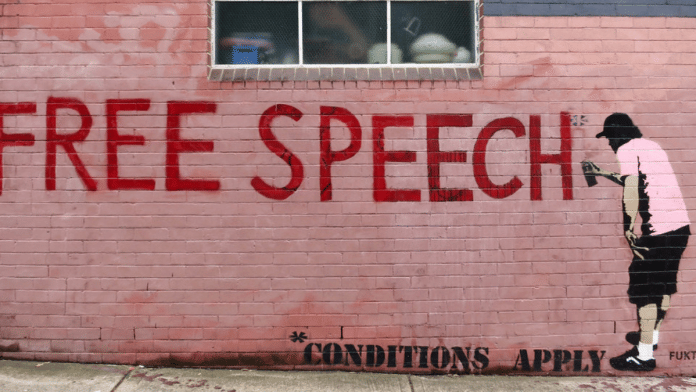Thank you dear subscribers, we are overwhelmed with your response.
Your Turn is a unique section from ThePrint featuring points of view from its subscribers. If you are a subscriber, have a point of view, please send it to us. If not, do subscribe here: https://theprint.in/subscribe/
It’s no longer the government you fear. It’s your neighbor, your colleague, waiting to pounce, not listen. We often imagine free speech in India being curbed by the state through censorship, restrictive laws, or internet bans. But what about the restrictions we impose on one another? Today, the real threat to free expression often comes from within society itself. Justice mobs, cancel culture, and viral misinformation have created a climate where disagreement meets not dialogue, but abuse and erasure. It’s convenient to blame governments, but democracy depends just as much on us. If we choose dialogue over outrage, and listening over trolling, we can rebuild a culture where speech is not just a right, but a shared responsibility.
The New Threat: Death by Society
Wars today aren’t always fought with ammunition, but with misinformation. A single false claim on WhatsApp or X (formerly Twitter) can spark panic and violence. Remember the bizarre rumor after demonetisation that Indian currency notes carried GPS tracking chips? It spread like wildfire until the Reserve Bank of India finally debunked it. But misinformation doesn’t stop at WhatsApp forwards. It often spills into television studios and prime-time debates, where sensationalism often takes precedence over truth. We’ve seen this play out before, whether in the coverage of Sushant Singh Rajput’s death, Recent RCB Stampede fiasco or the case of cancelling comedian Samay Raina. Facts were blurred, reputations destroyed, and due process trampled. And sometimes, the price isn’t just reputations, it’s lives. The brutal 2022 murder of Kanhaiya Lal in Udaipur, after a post he allegedly shared in support of Nupur Sharma, is a chilling reminder of how online outrage can spill into real-world violence.
This isn’t just about bad journalism or viral rumors. It’s about how outrage is replacing dialogue. Because the marketplace of ideas only works if we stop burning the stalls we don’t like.
Impact on Democracy and Social Harmony
Today’s outrage isn’t about ideology, it’s about confusion and manipulation. These aren’t debates over ideas, but battles over basic trust in facts. Recall the rumor in 2020 about an extended COVID-19 lockdown? Despite official denials, panic spread faster than facts could catch up. At the heart of this is a deeper problem: growing distrust in institutions. Trial by media and viral rumors sideline legal processes, replacing due process with mob judgment. As narratives shift from evidence to outrage, even confidence in the judiciary begins to weaken.
Social media was once envisioned as a space for dialogue. Now, it risks becoming a place where dissent isn’t debated, but erased. Online abuse, cancel culture, and trolling have created an atmosphere where even neutral, academic views feel risky to express. Take the case of economist Dr. Shamika Ravi in 2021. A balanced academic observation on urban planning was twisted into an ‘anti-development’ narrative, followed by relentless trolling, not reasoned debate.
Yes, the Constitution protects free speech under Article 19(1)(a). But what good is a right when people are afraid to use it? The Constitution can protect speech on paper; only we can protect it in practice.
Solutions & Call to Action
Tackling this crisis begins with individual responsibility. Before forwarding a post or reacting to outrage, we must pause, verify, and reflect. Media literacy isn’t optional anymore, it’s a civic duty. Campaigns like CyberSafe India, launched by the Ministry of Electronics and IT in 2022, have helped, but real change is to understand the freedom to speak is ours, but so is the responsibility to listen.
But individuals alone can’t fix this. Institutions and platforms must also act. Platforms like X introduced Community Notes in 2023, allowing users to provide context to misleading posts, a step in the right direction. Newsrooms must invest in fact-checking over TRPs. Schools and universities must include mandatory media literacy into their curriculum.
Change is possible, but it won’t come from hashtags alone. It will come from a collective commitment. Citizens demanding accountability, and institutions providing it. That’s how we turn online spaces into platforms for real conversation.
Conclusion
The real threat to free speech isn’t just in courtrooms anymore but also everyday outrage, viral misinformation, and online trolling. Every unverified forward chips away at meaningful dialogue. If we truly value democracy, we must rebuild a culture of respect, disagreement, and dissent. Because democracy doesn’t die in silence, it dies in noise. And only we can choose which one we create.
These pieces are being published as they have been received – they have not been edited/fact-checked by ThePrint.


